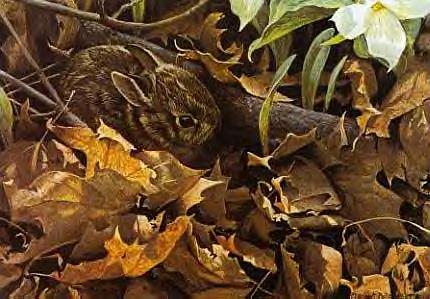
Canku Ota

(Many Paths)
An Online Newsletter Celebrating Native America
October 4, 2003 - Issue 97
![]()
"niyáwë skênö"
The Mingo Greeting
This phrase means hello, how are you?, how do you do?, good, well, or just fine.

Cottontail
Among the Leaves by Robert Bateman
"Penibagos"
Leaf Falling Moon
Abenaki
![]()
"We only ask to survive so that we can remain who and what we are - and for that we will always thank the Creator. We ask only the chance to pass on our way of life and our love for the Creator to our children and grandchildren." - Harriett Starleaf Gumbs - Shinnecock
![]()




